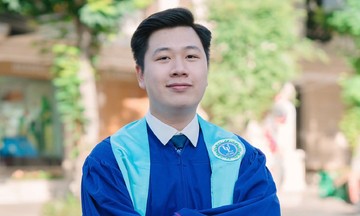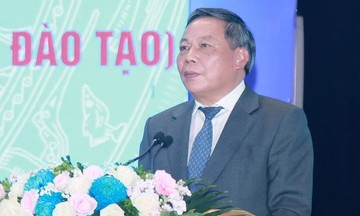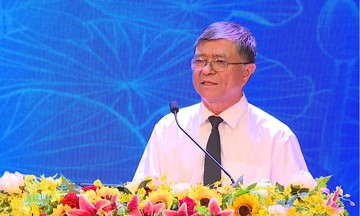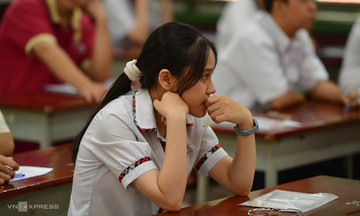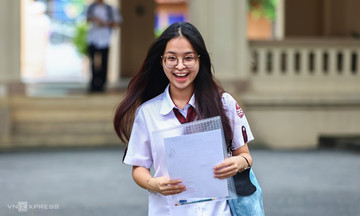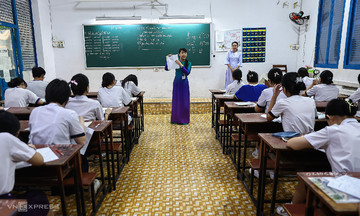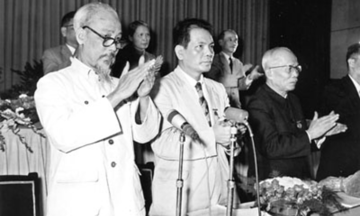 |
Professor Hoang Xuan Sinh, Vietnam’s first female mathematics professor and founder of the country’s first private university, Thang Long University, remains passionate about higher education at the age of 92. She continues to closely follow political, economic, and social developments.
“Education is about cultivating talent, and we must first identify the qualities that make a talented individual,” she said.
Professor Sinh then shared a simple yet profound mathematical formula, reflecting her own life philosophy:
“z = ax + by”
In an interview with VnExpress, she discussed her concerns and vision for higher education in the context of digital transformation and global knowledge integration.
 |
VnExpress: Professor, as Vietnam embarks on comprehensive reform with its “four pillars” – Resolutions 57, 59, 66, and 68 – what opportunities do you see for private higher education, particularly models like Thang Long University?
Professor Sinh: A university’s mission centers on two key aspects: training and research. Focusing solely on training without parallel research weakens faculty expertise, hindering them from keeping pace with scientific advancements. This creates a gap in meeting the increasing demand for high-quality human resources, potentially leading to declining student enrollment and eventual closure. We must understand why universities struggle with research. University funding typically comes from tuition, government grants, corporate donations, and research grants.
Currently, Vietnamese private universities rely almost exclusively on tuition, while still paying taxes. This barely covers operating costs, leaving little for research. This problem remains unsolved, leading some institutions, both public and private, to prioritize student recruitment solely for financial survival. This is a regrettable situation.
 |
To facilitate research, private universities, including Thang Long University, hope the government will lease land at preferential rates and offer tax breaks, enabling expansion and the development of high-quality research faculty. We have been grappling with these challenges for a long time. Fortunately, Resolutions 57, 59, 66, and 68 offer potential solutions.
 |
We are confident that these comprehensive reform resolutions will be effectively implemented, enabling universities to build high-quality teaching staff to meet the demands of a rapidly developing society in this era of exponential scientific and technological growth.
 |
VnExpress: You previously outlined a 100-year vision for Thang Long University, divided into three phases. Where is the university on this journey?
Professor Sinh: In 1988, when Thang Long University was established as a pilot model for a privately founded university, we began with no capital or land, relying on the promise of monthly contributions from overseas Vietnamese intellectuals in France. It was a romantic, perhaps unrealistic, notion. We quickly faced immense difficulties, with our rector and chairman holding multiple positions. We rented facilities, some lasting a few years, others only months. Every afternoon, after work, they would scour Hanoi’s outskirts on a motorbike, searching for a permanent location, only to find others in the same predicament.
We were in a tragicomedy, unsure of the future. Facing this crisis, we needed a plan. After much deliberation, the 100-year plan was born. We sent a dedicated engineer to France to study university and research institute development, with support from an overseas Vietnamese scientist. Upon returning, he collaborated with fellow engineers, securing land and funding. Construction began in 2005, and by early 2008, we moved into our new campus, praised for its beauty and surprisingly low construction cost.
 |
The first 20 years, from 1988 to 2008, saw the realization of our campus. The next 40 years were allocated to developing doctoral faculty, a timeline many questioned. However, the 17 years from 2008 to 2025 have shown slow progress due to lack of research funding.
VnExpress: You often cite Harvard University as an inspiration for building a research-strong university. What are the key “educational reform problems” Vietnam must address to create an internationally influential university?
Professor Sinh: An internationally influential university attracts high-quality students, both domestic and international, and boasts renowned professors. The first problem is ensuring access to education for all citizens. The government's decree on free tuition for all levels is significant, especially for rural students who often drop out due to financial constraints. Talent is distributed evenly across all social strata. The second problem is enabling universities to prioritize research. Globally, universities receive substantial government and corporate research funding, even with high tuition fees.
VnExpress: The Ministry of Science and Technology recently announced 21 major problems related to science, technology, innovation, and digital transformation. Does this offer opportunities for universities to engage in long-term projects with government and businesses?
Professor Sinh: Large projects allow professors to pursue their specialties with appropriate compensation, while graduate students gain research topics and scholarships. Major projects can even lead to post-doctoral research.
 |
VnExpress: In the age of AI, big data, and digital transformation, many countries are leveraging mathematics as a strategic advantage. How can Vietnam do the same?
Professor Sinh: University curricula worldwide demonstrate mathematics' importance in various scientific fields. When I led Vietnamese students to international math competitions, other delegation leaders wondered how students from a war-torn and embargoed country could compete with those from developed nations with strong mathematical traditions. I attributed it to our tradition of poetry, which, like mathematics, requires abstract thinking. Many mathematicians appreciate poetry and music. We must consider this connection when designing curricula, exploring how mathematics relates to other subjects. The relationship between mathematics and physics, economics, and other subjects is clear, but its connection to poetry and music remains unexplored. Studying these relationships can enhance math learning, making it more accessible and engaging, ultimately transforming it into a national strategic advantage.
 |
VnExpress: As the first Vietnamese woman to defend a doctoral thesis in mathematics, under the guidance of Alexander Grothendieck, what is his most cherished legacy for you?
Professor Sinh: Despite limited direct interaction due to geographical distance, Professor Grothendieck left me an invaluable legacy: simplifying the complex and living authentically. I honor this legacy through diligent work, honesty in thought and word.
VnExpress: What three keywords best describe your intellectual journey as a pioneering leader?
Professor Sinh: Throughout my journey with Thang Long University, I have focused on "Labor - Perseverance - Kindness". I share these words with my students. These are the lessons I learned from developing and implementing the 100-year plan.
 |
VnExpress: Rector Truong Nhat Hoa is continuing your legacy at Thang Long University. What guiding principles do you hope he will follow?
Professor Sinh: I have faith in the younger generation. As we age, health declines, making it harder to keep up with scientific and technological advancements. My experience belongs to the subsidy and early internet era, while today’s youth live in the age of AI and digital transformation. When promoting young leaders, there are concerns about their lack of experience. But only the young possess the energy to embrace new knowledge. We need young leaders to shape Vietnam’s educational future. Education is about cultivating talent, and we must recognize its qualities. I often tell Truong Nhat Hoa, "Talent is 99% persistent work and 1% aptitude." Mathematically: z = ax + by, where z represents talent, x is persistent work, y is aptitude, a is 99%, and b is 1%. I hope this guides Hoa and his young colleagues at Thang Long University, as they train high-quality human resources for Vietnam's comprehensive reform, ushering our nation into a new era of prosperity and strength.
 |
Content: Chi Dung
Design: Thai Hung
Photo: Thang Long University



